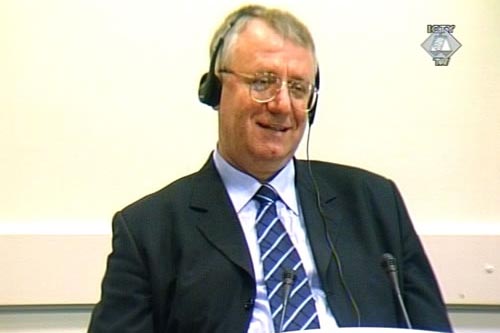Home
APPLICATION FOR AMENDMENT OF INDICTMENT AGAINST SESELJ
On the basis of new evidence, the prosecution seeks leave to amend the indictment against Vojislav Seselj, including new allegations of crimes committed by Seselj's men in the wider regions of Sarajevo, Bijeljina, Mostar and Nevesinje.
 Vojislav Seselj in the courtroom
Vojislav Seselj in the courtroom In last January’s original indictment, leader of the Serb Radical Party Vojislav Seselj was charged with crimes against non-Serbs in Vukovar and Vocin in Croatia, the village of Hrtkovci in Vojvodina, and in two municipalities in Bosnia and Herzegovina: Zvornik and Bosanski Samac.
On the basis of new, recently acquired evidence, the Office of the Prosecutor of the Hague Tribunal says it has sought leave from the Trial Chamber to amend the indictment against Seselj to include new allegations. The amended indictment, submitted to judges for review, lists crimes committed by formations made up of Chetniks or Seselj's men in five municipalities in the wider regions of Sarajevo (Ilijas, Vogosca, Novo Sarajevo, Ilidza and Rajlovac), Bijeljina, Mostar and Nevesinje.
The amended indictment up for review alleges that in the village of Ljesevo in the wider region of Sarajevo, Seselj's men killed 22 non-Serb civilians on 5 June 1992. In the summer of 1993, Seselj's men cut off the head of a civilian and killed five prisoners of war in the Crna Rijeka area in the municipality of Ilijas. In the same period, a unit of Seselj's men killed 25 civilians who had been used as human shields on the Zuc hill in the municipality of Vogosca and two prisoners of war on the Igman Mountain in the municipality of Ilidza.
On 31 March 1992, the amended indictment alleges that Seselj's men took part in the capture of Bijeljina and the execution of six civilians. After taking the town, the indictment goes on, Serb forces, including Seselj's men, "routinely detained, beat, sexually assaulted, tortured and killed" non-Serb civilians. Between April 1993 and September 1993, hundreds of non-Serbs were detained in the SUP building and in the Batkovic camp. About a hundred detainees died as a result of abuse and inhumane conditions.
According to the indictment, on 13 June 1992 in the Mostar area, Seselj's men arrested 88 civilians, detained them on a football field in Vrapcici and killed them. The same day, Seselj's men took 18 non-Serb civilians from the village of Zelik to Sutina, killed them and threw their bodies into a hole in the ground near the Neretva River.
The amended indictment also alleges that on 22 June 1992, Seselj's men arrested 76 Muslim civilians in the Nevesinje area, took them to the elementary school in Dnopolje, killed all the men and detained the women and children in the heating plant in Kilavci. Forty-four women and children were subsequently killed and thrown into a hole in Lipovaca. It is further alleged that in the Nevesinje area, Seselj's men arrested 11 Muslim civilians on 26 June 1992, torturing them in the school in Ziemlje. Seven of them were subsequently taken away and killed. The same month in 1992, Serb forces--including Seselj's men--arrested and detained 20 Muslim civilians from the village of Lakat. Nineteen of them, reads the indictment, were killed on the Borasnica Mountain.
Although containing new allegations, the new indictment has the same number of counts as the previous one, charging Vojislav Seselj with persecution on political, racial and religious grounds; extermination; murder; detention; torture; cruel treatment; deportation and forced displacement of the population; and the wanton destruction and plunder of public or private property. In a total of 14 counts, these crimes have been qualified as crimes against humanity and violations of the laws and customs of war.
Linked Reports
- Case : Seselj
- 2004-10-04 ON PAPER AND IN SERBIAN, PLEASE
- 2004-09-06 VOJVODINA TO REMAIN IN SESELJ INDICTMENT
- 2004-07-22 PROSECUTION OPPOSES PROVISIONAL RELEASE OF VOJISLAV SESELJ
- 2005-05-30 SESELJ IN "BAD COMPANY"
- 2005-07-14 TWO-MONTH BAN ON COMMUNICATION FOR VOJISLAV SESELJ
- 2005-08-31 SESELJ RENOUNCES HIS "BOMBASTIC STATEMENTS"
